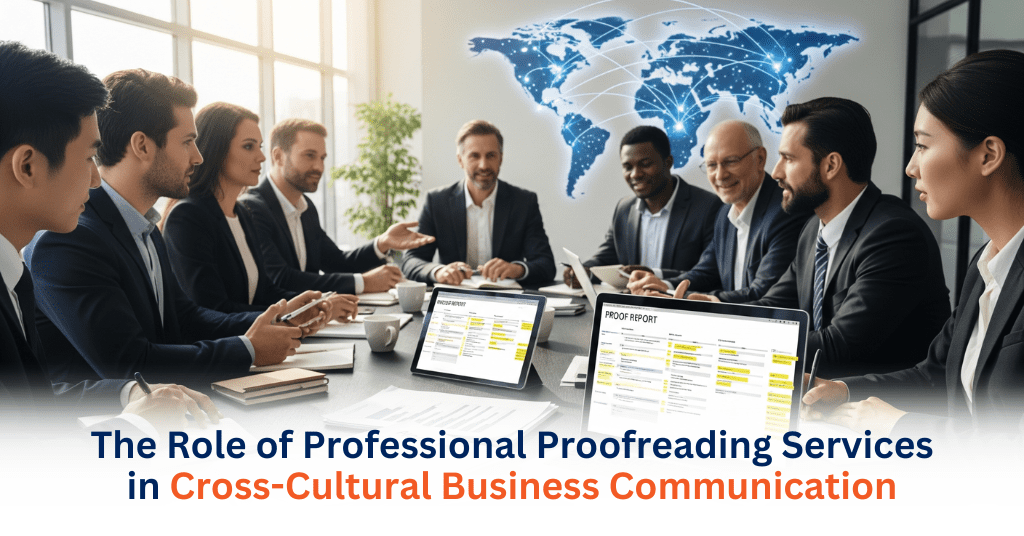You know what’s wild? Businesses in the United States and the United Kingdom throw away around $37 billion every year just because people don’t get each other. I’m not talking about big disasters—just plain old misunderstandings.
Even a small 100-person company can burn through half a million dollars a year this way. Now throw that chaos into a cross-cultural mix. One slip in tone, some phrase that just falls flat, or a layout that feels wrong on their side—and boom, you’ve either baffled them or ticked off the wrong person.
Professional proofreaders cut that risk. They know how to tweak your words so they fit cultural norms, read clearly, and stay consistent across regions.
Whether it’s an investor report or a marketing push, they make sure your message doesn’t blow up on you and that you build trust with partners in the United States and other countries.
The Cross-Cultural Communication Challenge in Business
Cross-cultural business talk is a minefield. Tone, politeness, idioms, formality—it all flips depending on where you are. What feels perfectly straight-up in one place can hit like you just slammed the door in someone’s face somewhere else. Toss in an idiom and you might lose your audience completely.
Marketing slogans? They can flop hard if the cultural read is off. Contracts? Different legal language can twist the meaning before you even realize it. Even inside multinational teams, a simple phrase can derail a decision.
Say “We’ll table this discussion” in the United States, and people put it on hold. Say the same thing in the United Kingdom, and they move it to the front of the line. Total opposite results.
The only way around this is to review every word carefully so it lands right in every market—and that’s exactly where professional proofreaders earn their keep.
How Professional Proofreading Ensures Cultural Clarity
Professional proofreading isn’t just fixing grammar. It’s making sure what you say actually hits with the people you’re talking to.
You swap out idioms, shift the tone, tweak the formality—so it still says what you meant, but it lands the way it should. And the details matter—dates, numbers, currency, measurements—mess those up and you’ve already lost them.
Proofreaders catch the sneaky stuff, too, those “false friends” that look harmless but mean something else somewhere else. Like “chips”—in the U.S., that’s the crunchy snack in a bag; in the U.K., that’s fries on a plate. Get that wrong, and even in your own language, you’ve lost them before you even realize it.
That’s why a proofreader steps in, makes it sharp, makes it clear, and makes sure it works for anyone, anywhere. That’s how you build trust instead of wrecking it.
Maintaining Consistency in Multi-Author, Multi-Culture Projects
Put a bunch of writers from different countries on the same document, and it falls apart quickly. Each writer brings their own way of saying things, their own habits. You read it, and it’s like jumping from one style to another—no flow, no unity.
A professional proofreader steps in and cleans that up. They make sure it all sounds like one voice, not ten. If the audience is in the U.S., they’ll stick to “color.” If it’s for the U.K., it becomes “colour.” In big corporate reports with input from teams in the U.S., Europe, and Asia, they make the vocabulary, punctuation, and tone match across the board.
Style guides are fine, but they’re just words on paper. It’s the proofreader, sitting there going through every single line, that actually makes the thing flow. They smooth it out so anyone, anywhere, can read it without stumbling or stopping to wonder what just happened.
Avoiding High-Stakes Miscommunication
Cultural mix-ups in business? They can cost you money, legal trouble, and a dent in your reputation. One vague line in a contract and suddenly you’re stuck in a dispute or facing some weird interpretation in another country’s court.
One wrong note in an email can put a partner off, and once that trust is gone, it’s hard to get back. Say the wrong thing in a negotiation, and you’ve just given the other side the upper hand. These kinds of mistakes hit hardest in the big stuff—investor reports, partnership deals, strategic proposals.
That’s why professional proofreading isn’t just some spellcheck exercise. It’s making sure every word hits right and says exactly what you mean. Miss that, and you’re sitting on a time bomb. Fix the small stuff before it leaves your desk, and you won’t be up at night replaying the mess in your head.
Proofreading for Culturally Appropriate Marketing Content
Marketing copy can be a disaster if it’s not in sync with the culture it’s meant for. You think you’ve nailed something clever, but in another country, it lands like a brick—or worse, it offends. I’ve seen it happen.
That’s why professional proofreaders are not just a nice extra—they’re the shield between your brand and a public facepalm. They go through slogans, taglines, product descriptions, and spot the things that just won’t work—jokes that fall flat, idioms that make no sense, images that send the wrong message. And they don’t just strip things out; they swap them with something that still hits hard but actually connects with the audience.
That light, casual tone that charms people in the United States? In Japan, it might have to be tightened into something more formal—but still carry the brand’s voice. Because here’s the truth: if you don’t get the language right for the people you’re talking to, your campaign won’t just miss—it’ll crash, and you’ll feel it.
Collaboration with Localization Teams
You know what happens after a translation looks “done”? People assume it’s good to go. Looks finished, right? But that’s actually when it begins. Even the cleanest-looking translation can hide tiny cracks—one odd line, one strange word—that no one notices until it’s already out in the world. And once they’re there, trust me, those little cracks can wreck the whole flow.
This is where proofreading steps in and takes over. They go through every line like they’re feeling for loose wires, making sure it reads like it was born in that language, not patched together from another one.
And it’s not just the words. They check if the tone lands, if the examples make sense there, and if the style actually fits the local vibe—so nothing feels off or sticks out like a bad note in a song. This is the last gate before your content walks out into the world. It’s where they catch those sneaky errors or awkward bits before they embarrass you. Skip it, and you’re the one who takes the hit.
Proofreading is what shifts your localized content from “yeah, it’s correct” to “it feels right, it sounds natural, and it hits exactly how it should for the people it’s meant for.”
Conclusion
Cross-cultural business communication isn’t just about knowing the language — it’s about knowing how your message will land in each market. That’s where professional proofreading comes in. It’s the last set of eyes that knows the audience and can make sure every word actually works for them.
The big takeaway here? Stop thinking of proofreading as that last-minute touch-up. Bring it in from the very beginning. That’s how you spot problems before they blow up, keep your business relationships solid, and give yourself a real shot at getting the results you want in every market you walk into.









